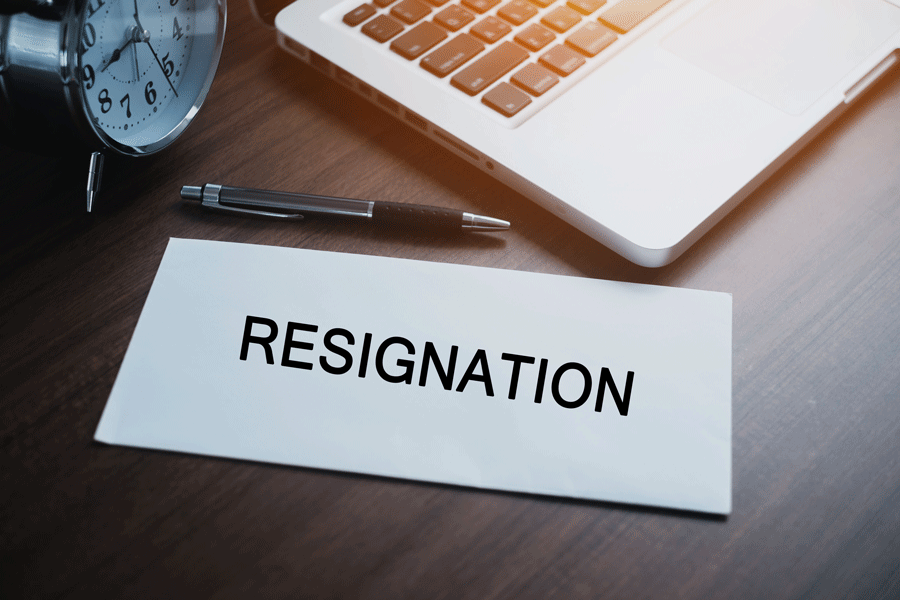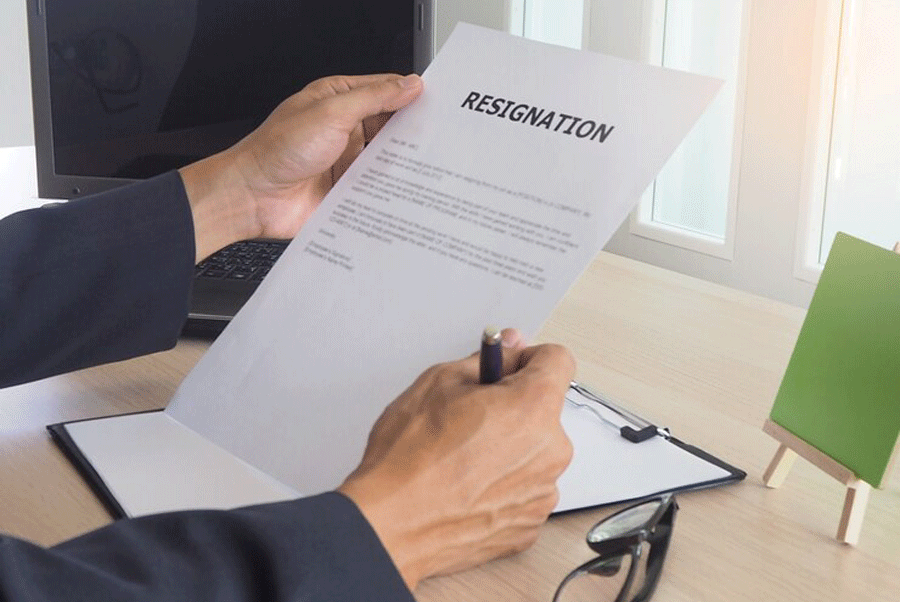Resignation letters are an inevitable part of the workplace. Whether it is due to personal or professional reasons, an employee may want to leave their job at some point in time. While these, for personal or professional reasons as well, are a necessary part of the business, they can be emotionally difficult for employees and employers alike. Ideally, the resignation letter should convey all the information about why you are quitting the job without revealing too much information that could hurt your reputation or relationships with future employers.
Given that you need to resign from your job due to personal reasons, it can be challenging to determine how to explain these reasons to your employer without coming off as being too selfish or self-centered, how much information to share, and what tone to use throughout the letter to make it effective.
It is important to note that you are not obligated to provide details to your employer when writing a personal resignation letter.
EXAMPLE
You can state that you have decided to quit the job due to personal issues or family problems. This is primarily helpful in cases where your reasons for leaving the organization are not related to the job or in cases where there was a conflict between you and your supervisors or co-workers.
While some employers may be satisfied with just knowing that an employee is resigning from their job due to personal reasons, others might want details about what contributed to this decision. In such scenarios, you will want to include reasons for leaving. Still, you must provide vague reasons to avoid raising any suspicions that could burn your bridges with the current employer.
You might be interested in working for the employer in the future, and as such, you will want to leave on good terms to make your case for being rehired in the future. It is also vital that you ensure the tone of your letter is professional and positive and avoid showing any emotions towards the company or your boss.
Regardless of your reason for resigning from your current job position- either due to positive or negative reasons—you must write a professional letter and give adequate notice to ensure that your resignation is accepted. You have to maintain a positive relationship with your employer so that you can use them as a reference for your future job search and employment endeavors.
NOTE
Under no circumstances should your letter of resignation become a tirade against your employer. Whatever your feelings, keep it professional and remain as objective as possible. Besides, the letter should not be an outlet for you to voice or raise your grievances with the company.
Instead, consider scheduling a face-to-face meeting with your employer and deciding whether you will voice your detailed concerns during the meeting. Additionally, you can reach out to your company’s HR department or bring them up during your exit interview to avoid risking your reputation with the company.
Free Templates and Examples
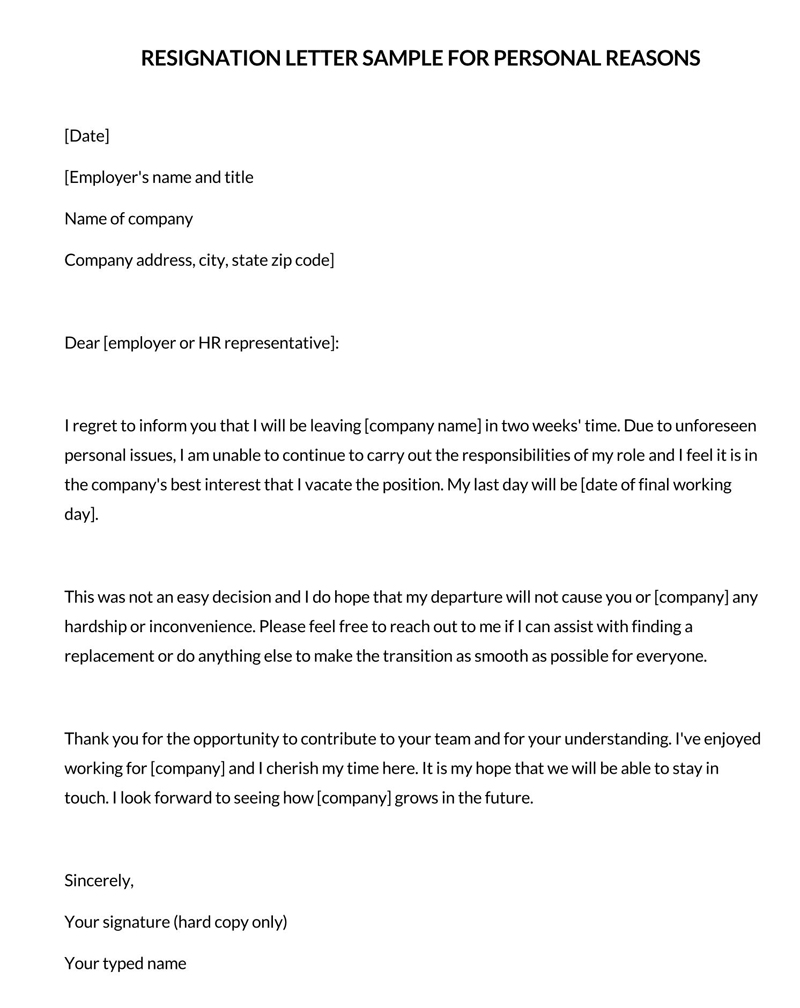
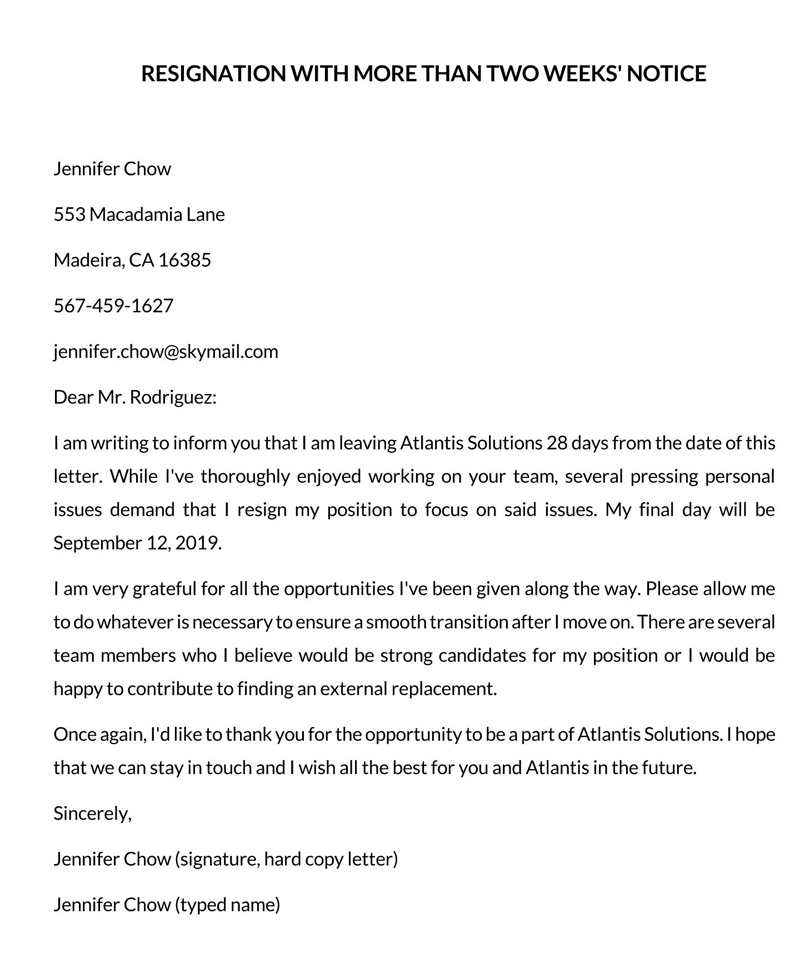
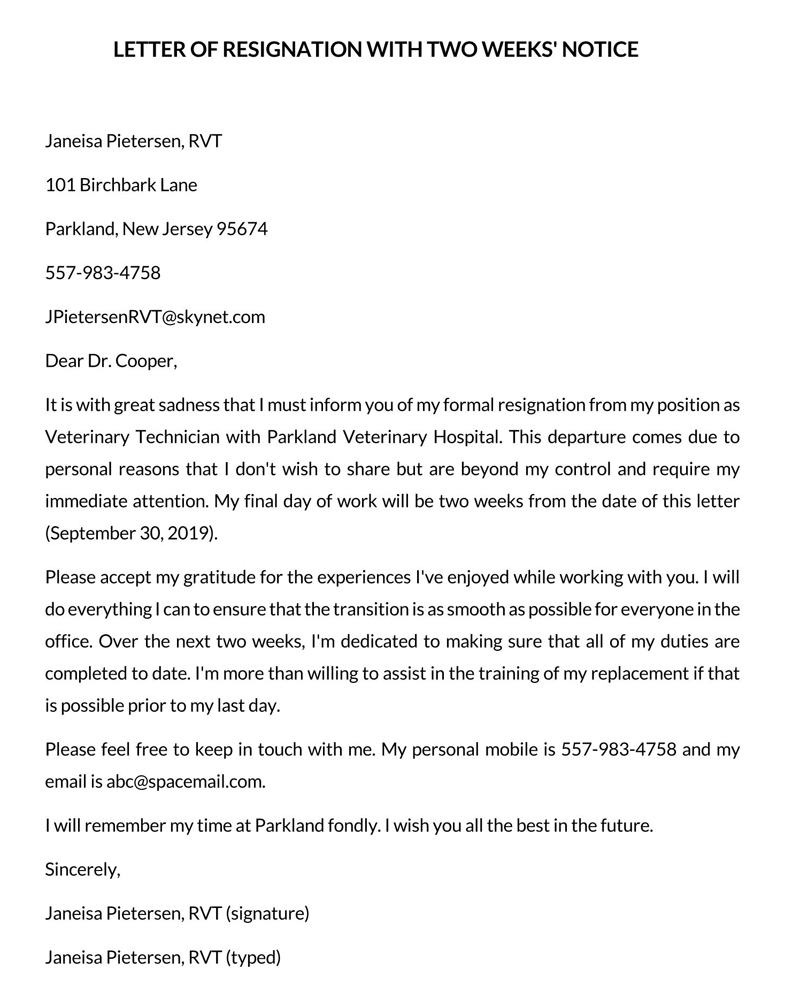
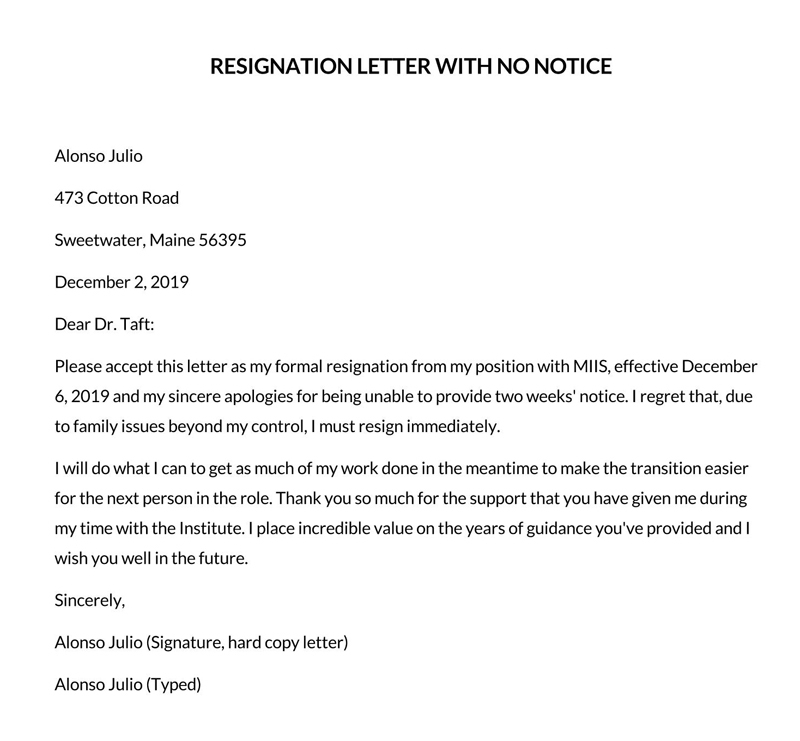
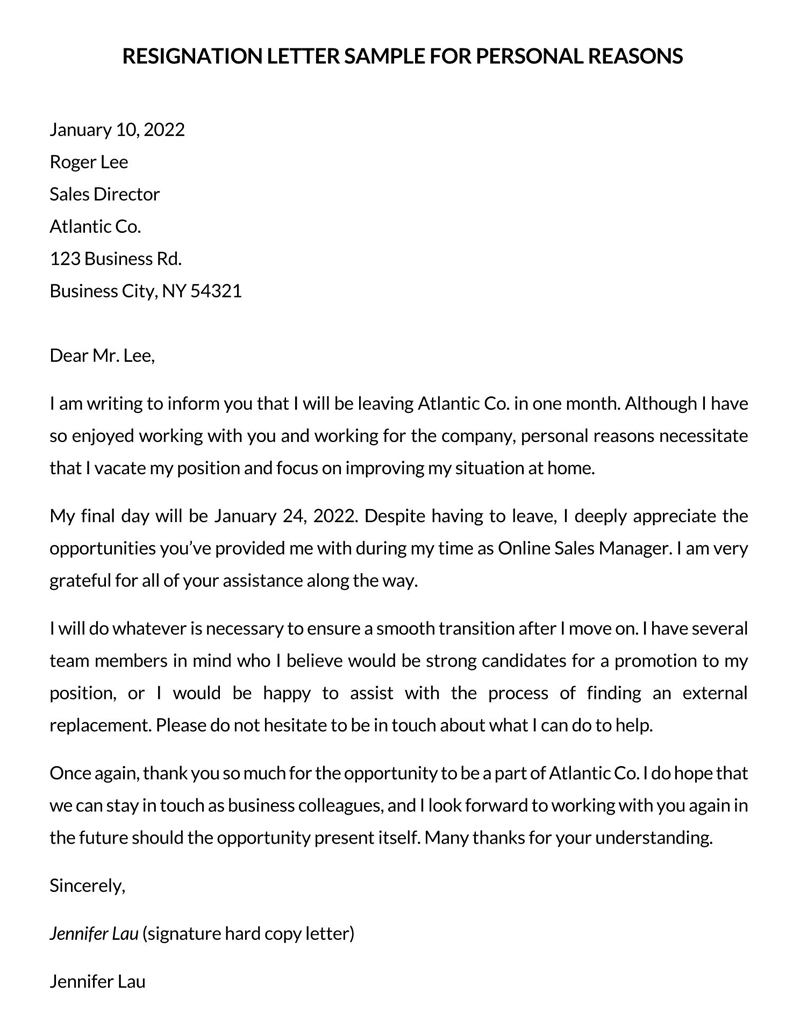
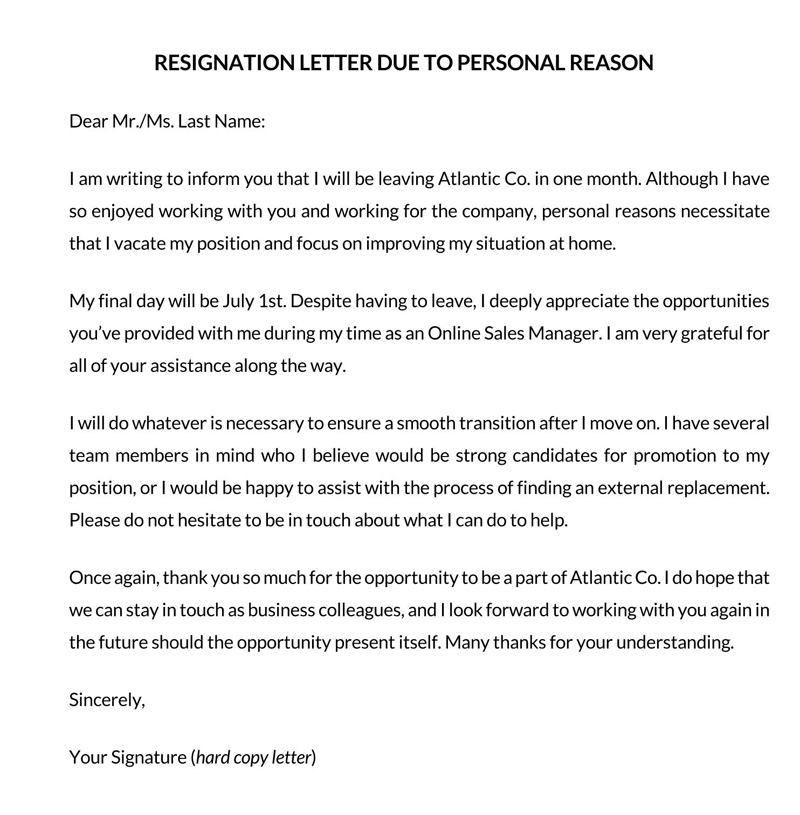
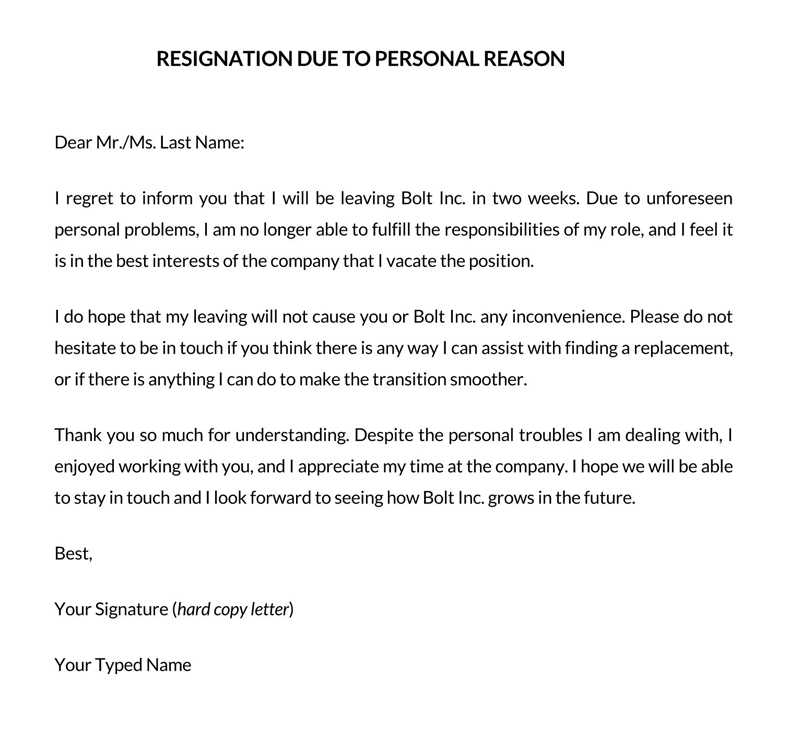
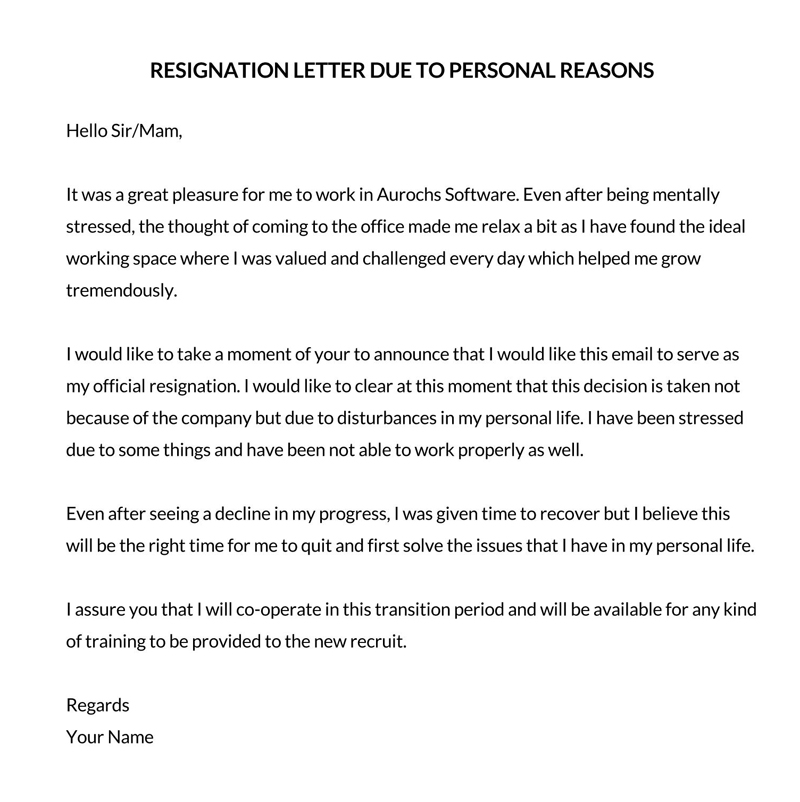
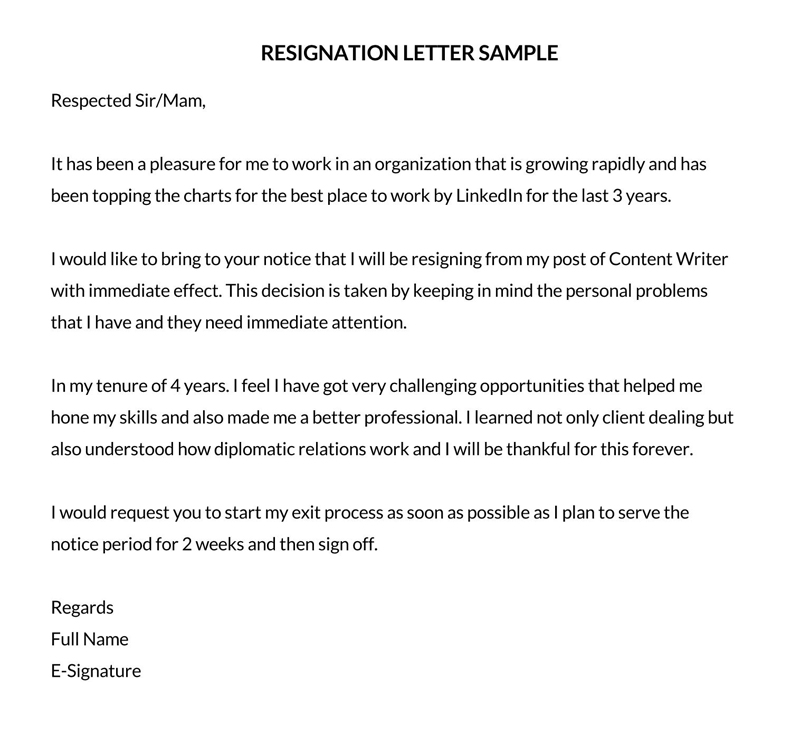
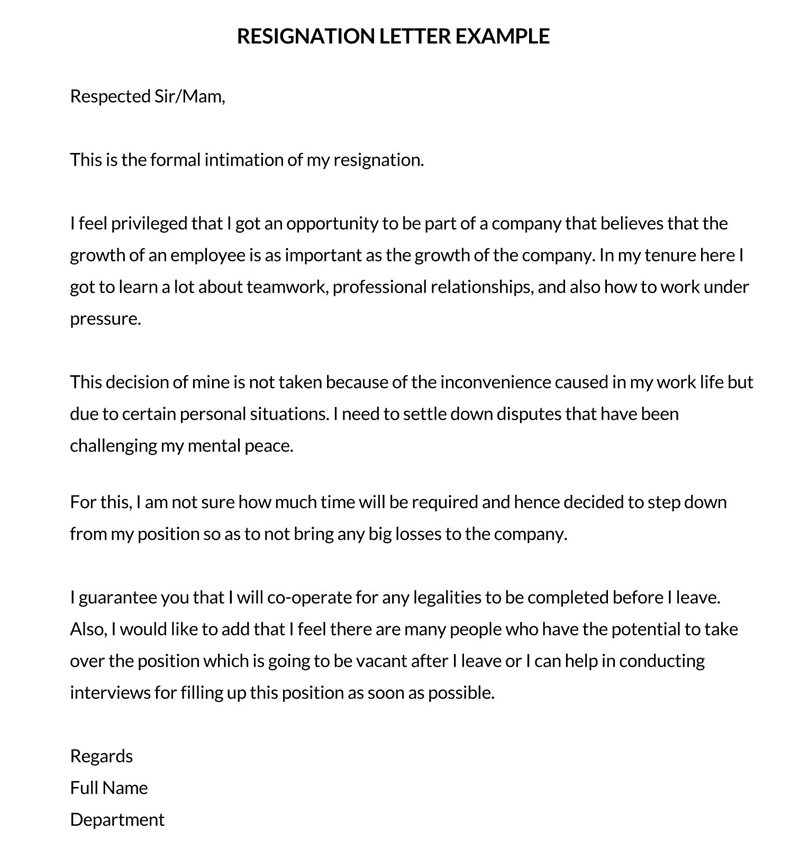
What Makes It Important?
These are essential for several reasons:
First, they provide your employer with a formal notice that you will be quitting. If you fail to give this notice and allow your employer adequate time to transition, it may pose severe consequences for your job security and prospects in that company or elsewhere.
Secondly, if things work out well, it can help you land a new job with a company you may not have otherwise considered through network referrals and good references. As such, you should always strive to be professional throughout the letter and mainly highlight the company’s positives rather than the negatives.
Essential Information to be Included
When resigning from your position due to personal reasons, including all the necessary information in a formal letter is crucial. This ensures that both you and the employer are on the same page as you part ways. When drafting such a letter, it is imperative to be transparent about your situation and focus on why you must leave the organization.
A formal letter should include the following information:
Statement of intent to resign
The introductory paragraph should immediately communicate your intent to leave the organization. Make this section brief and concise to avoid any confusion.
Date of your last day
State the date that you believe would be your official leaving date/last working day, which can typically be arrived at by looking at the notice period stated in your employment contract. In most cases, it will be 2-4 weeks, but it could be much longer depending on the nature of your job and your current position in that organization.
Reasons for leaving the organization
Next, provide a brief explanation of your reasons for wanting to exit the organization. It is crucial to understand that employees decide to resign from their job positions for various reasons; therefore, you need to be clear and straightforward.
The way you phrase this section can play a significant role in helping you maintain a positive relationship with your soon-to-be-ex-employer; thus, it is always good practice to explain your reasons clearly and rationally.
It is often best to keep this to one main reason because employers are busy people, and they probably would not want to read through a long list of reasons why you have decided to quit your job.
On the other hand, if several factors have contributed to the decision to resign from your post, consider only stating whichever is most poignant. Focusing on how your reasons for leaving the organization relate specifically to your role is also a great idea, as it helps you exit the organization on good terms.
Thank your employer
Even though you are leaving the organization, it is important to acknowledge that your employer has still provided an opportunity for growth in your job role. Thank them for the opportunities they presented to you or the experience you gained while working for the company.
You could also highlight a few employees within the organization that you have worked with and state that it has been your pleasure working with them and that you hope the time spent with them has been beneficial.
NOTE
Even if you leave the organization for negative reasons, resist the temptation to bad-mouth your boss or co-workers to avoid burning bridges. It is always best to handle your reason for resignation letter as you would with any formal business letter professionally.
Offer to help with the transition
If possible, offer to help your employer with the transition process. This is considered good business etiquette, and it demonstrates your ability to look beyond yourself and focus on the employer’s needs. Besides, it is an excellent way to end your employment on the right note.
EXAMPLE
You could offer to help the employer find a replacement for you or offer to train and onboard them with the basics of the new role. If you can be flexible about your official last day at the organization, you can also include an offer to stay longer to help make the transition smoother for your co-workers and employer.
Ask questions
If you have any questions for the employer, for example, about how to handle issues with company-provided- benefits and vacation time payouts, severance packages, security pass checks, etc., consider asking in the letter.
NOTE
Having a face-to-face discussion with your employer, followed by a formal letter, is the most effective way to let them know you are planning to leave. Sometimes personal issues might be urgent, forcing you to resign hastily.
In such scenarios, it is acceptable to resign over a phone call or send an official email correspondence notifying the employer that you will resign from your job. Nonetheless, you will still have to be professional about it.
Resignation Letter Due to Personal Reasons Template
[Your Name]
[Your Address]
[City, State, Zip Code]
[Email Address]
[Phone Number]
[Date]
[Supervisor’s Name]
[Their Title]
[Company Name]
[Company Address]
[City, State, Zip Code]
Dear [Supervisor’s Name],
I am writing to formally announce my resignation from my position as [Your Position] at [Company Name], effective [Last Working Day, typically two weeks from the date of the letter]. After much consideration, I have made this difficult decision due to personal reasons that require my immediate and full attention.
I want to express my sincere gratitude for the opportunities I have been given at [Company Name] and for the invaluable experiences I have gained during my time here. It has been a pleasure working with you and the team. I am particularly thankful for the support and professional growth I have experienced as part of this company.
I am committed to ensuring a smooth transition and will do everything in my power to hand over my responsibilities effectively. I am happy to assist in training my replacement or in any other way that can help ease the transition.
Please let me know how I can further assist in the coming weeks. I wish [Company Name] and all my colleagues the very best and hope to stay in touch in the future.
Thank you again for the opportunity to be a part of [Company Name]. I look forward to your understanding and support during this transition period.
Sincerely,
[Your Signature (if sending a hard copy)]
[Your Typed Name]
Sample Letter for Personal Reasons for Resignation
Dear Mr. Greene,
I am writing to formally resign from my position as Project Manager at Innovatech Solutions, with my last day being March 20, 20XX. This decision has not been easy, but due to unforeseen personal reasons that require my immediate and undivided attention, I find it necessary to step down from my role.
I want to express my deepest gratitude for the opportunities and experiences that Innovatech Solutions has provided me over the past three years. Working under your leadership and alongside such a talented team has been incredibly rewarding. I have grown both professionally and personally, and for that, I am truly thankful.
I am fully committed to ensuring a smooth transition over the next two weeks. I will complete all pending projects to the best of my ability and provide comprehensive handover notes for my successor. Additionally, I am available to train or assist my replacement during this period to minimize any disruption to our team’s operations.
Please let me know if there are any specific tasks or projects you would like me to prioritize during my remaining time. I aim to leave my position in the most orderly and seamless manner possible.
Thank you once again for the support and opportunities you have provided me during my tenure at Innovatech Solutions. I hope to maintain our professional relationship and look forward to possibly crossing paths in the future.
Sincerely,
Samantha Lee
Key Takeaways
This resignation letter effectively communicates the writer’s decision to resign from their position as a Project Manager at Innovatech Solutions. Here’s why it’s effective:
Clear and Concise: The letter is succinct and to the point, stating the intention to resign, the last working day, and the reason for the resignation without unnecessary elaboration.
Gratitude and Professionalism: The writer expresses gratitude for the opportunities and experiences gained during their tenure at the company. This demonstrates professionalism and leaves a positive impression despite the resignation.
Commitment to Transition: Samantha assures her commitment to facilitating a smooth transition by offering to complete pending tasks, provide handover notes, and assist with training her successor. This proactive approach shows responsibility and consideration for the team’s continuity.
Openness to Priorities: By inviting input on specific tasks or projects to prioritize before leaving, Samantha shows flexibility and a willingness to accommodate the company’s needs during the transition period.
Politeness and Respect: The letter maintains a polite and respectful tone throughout, addressing the recipient appropriately and expressing a hope to maintain a positive professional relationship in the future.
Overall, this letter effectively conveys the resignation while maintaining professionalism, gratitude, and a commitment to ensuring a smooth transition, which are essential elements in departing on good terms from a position.
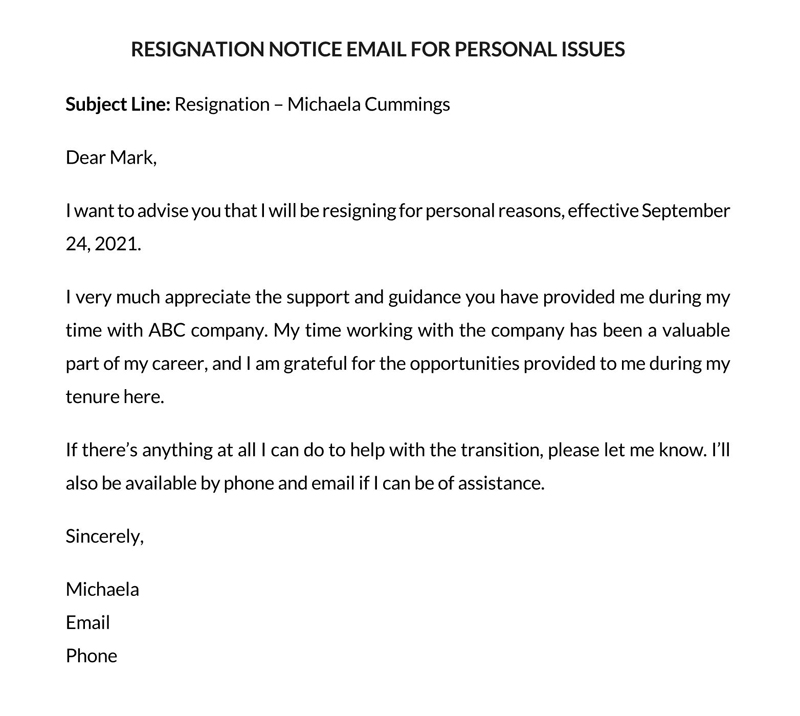
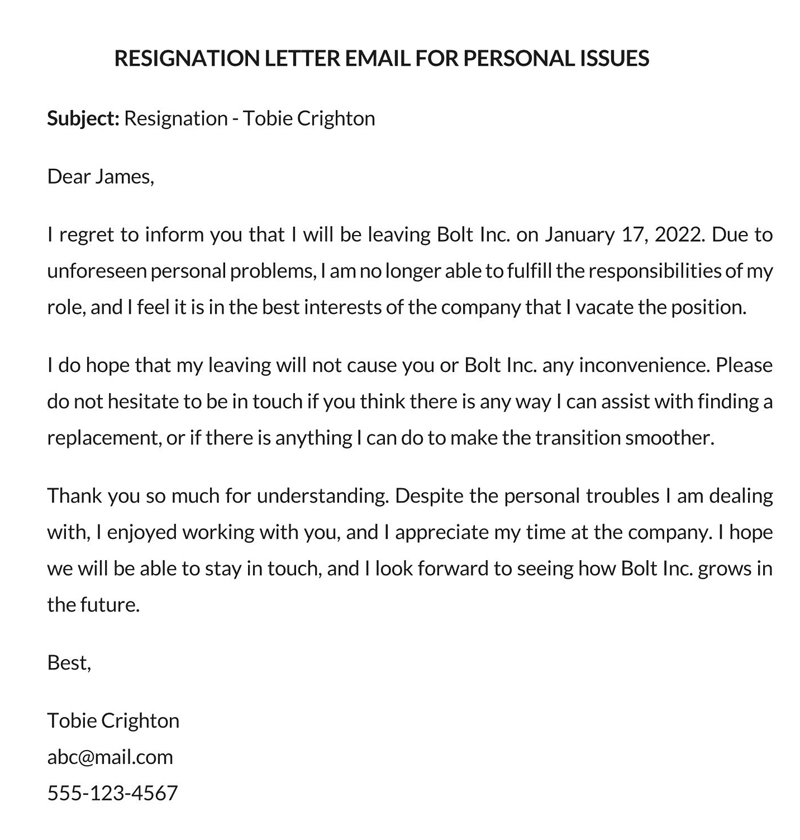
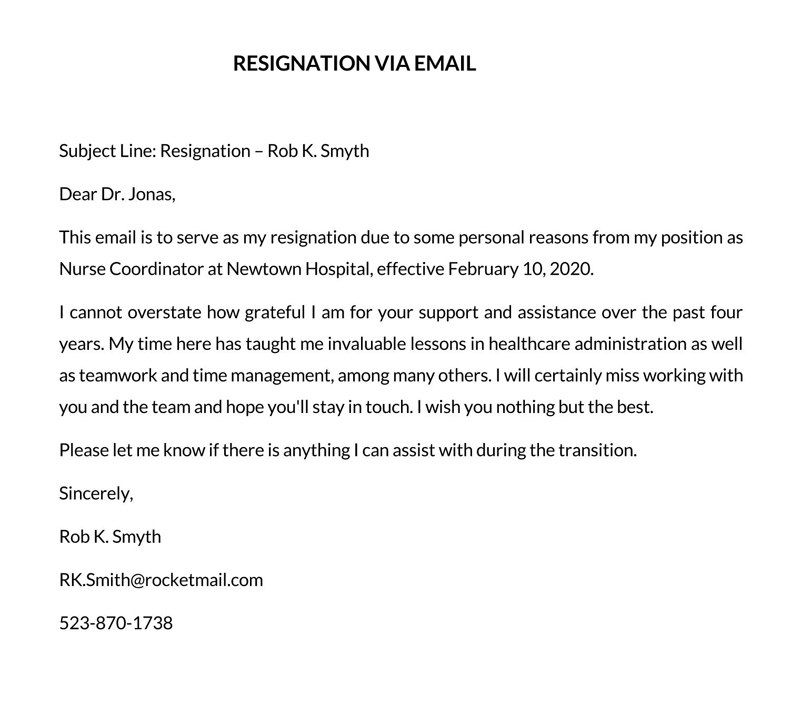
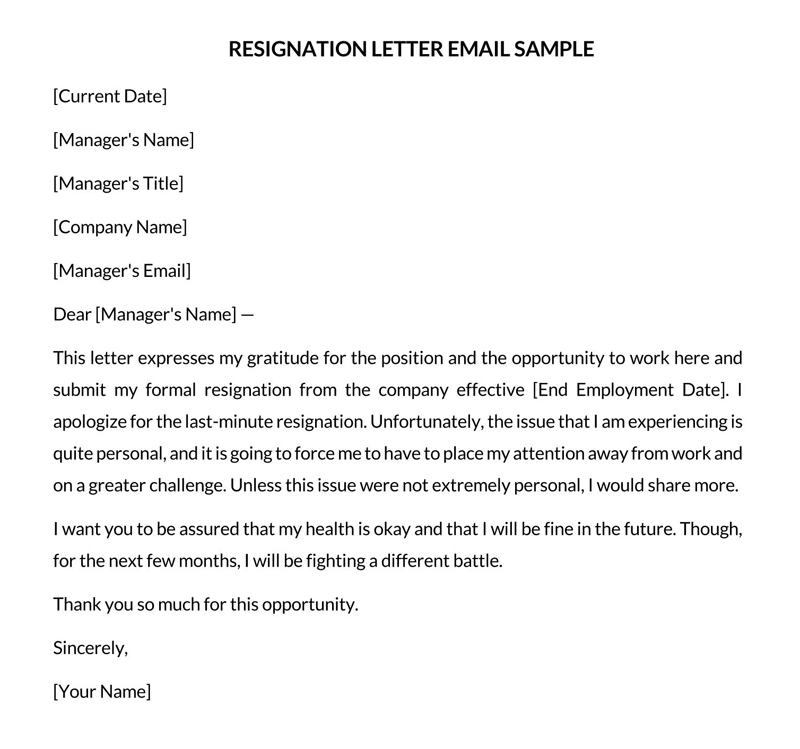
Tips for Writing a Compelling Letter
The following are valuable tips and best practices for writing an effective letter due to personal reasons to maintain a positive relationship with the employer and ensure that it is accepted:
Be positive
It is always a great idea to remain positive throughout the letter. Avoid including any negative language or constructions.
EXAMPLE
Instead of using “I must leave” or “Due to my circumstances,” state that you are choosing to leave as you find it necessary at the time.
It is unnecessary to include specific personal reasons for leaving, but if you decide to include them, choose your words carefully and be concise. State facts rather than feelings and focus on the present situation and factors that impact your decision. This is to ensure that you leave the organization on a positive note.
Talk to your employer first
If possible, talk to your employer, in person, about your decision to leave the company before submitting your formal resignation. This demonstrates your professionalism and dedication to the role, and your manager will be prepared for your resignation, making it easier for them to accept it.
Use the business letter format
Write the letter in a formal business correspondence format because it is a formal letter written professionally. This means including a heading with your name, address, contact information, date, and a formal salutation addressed by name to the letter’s recipient.
Proofread your letter
Before submitting your letter to the manager or employer, make sure you thoroughly proofread it to identify any grammar, spelling errors, and punctuation mistakes and correct them accordingly. Also, consider asking a friend to read through your letter to help you polish it effectively.
Follow the company’s policy
If you must give two weeks’ notice before resigning from your post, follow that process to the latter. If not, giving at least two months’ notice is standard, but it is always best to check with your company’s resignation policy before sending out your reason.
Be courteous
Thank your co-workers for being kind to you. It is best to avoid including any negative comments about your co-workers and employer to demonstrate your professionalism and maintain a positive relationship with your soon-to-be-ex-employer.
Final Remarks
Writing an effective letter ensures that you maintain a positive relationship with your employer, increasing your chances of getting positive references from them for future jobs or being rehired when better opportunities arise within the organization. Before you start writing the letter, ensure to check your employer’s policy to ensure you are aware of the required notice period. Always give as much notice as possible to allow your employer extra time to hire and train your replacement.
Craft your letter professionally and refrain from using any slang or negative comments that could be considered rude or inappropriate to the employer to ensure work continues without any problems before the end of your employment at the organization. Besides, you might need the employer’s help with future employment opportunities, and you do not want to miss out on the perfect job in the future. Thus, make sure you leave the organization with the right level of grace and decorum.





